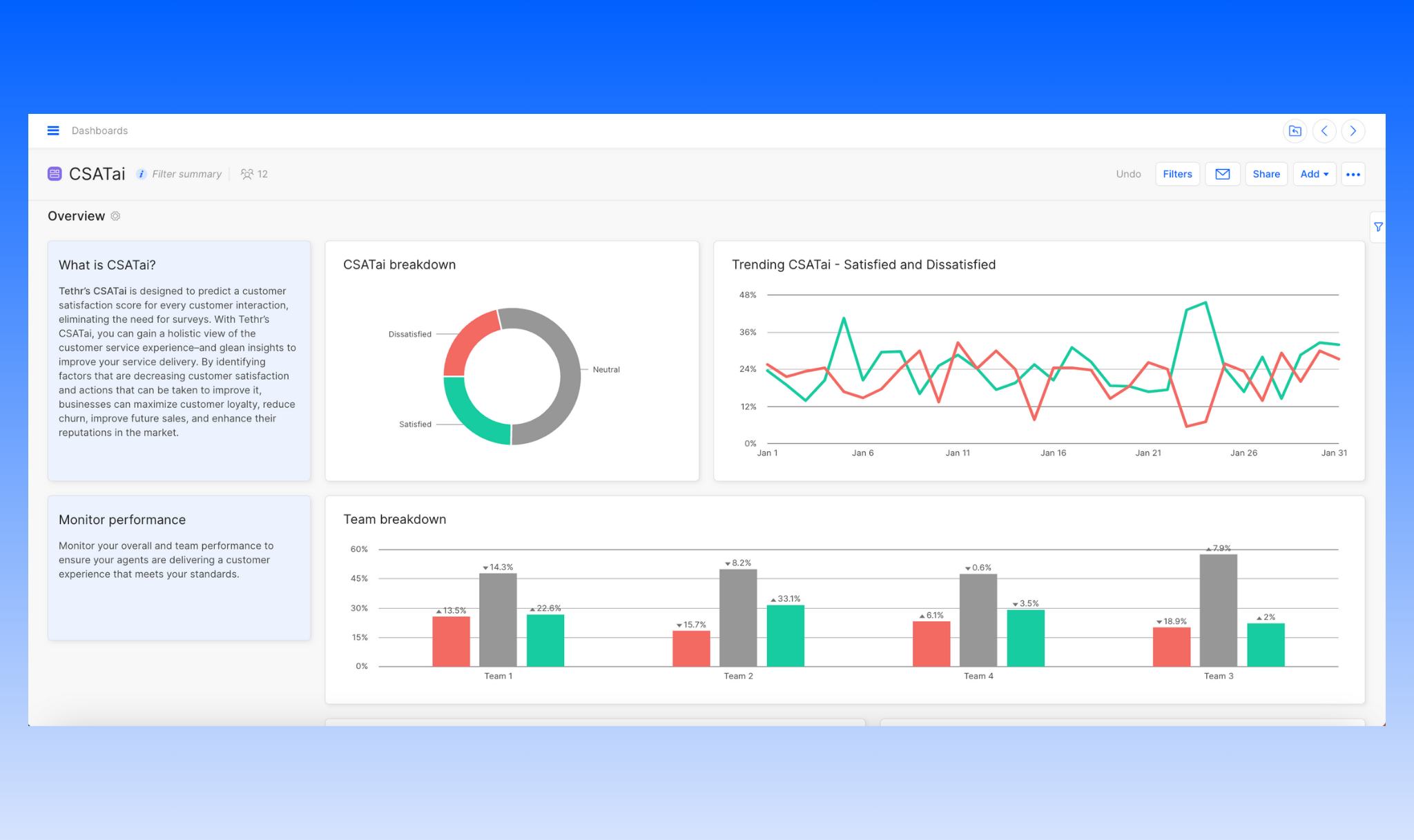Move over, post-call surveys: AI-powered CSAT is here
Tethr's CSATai predicts a CSAT score for every customer conversation--eliminating the need for surveys.
Carl Schultze
August 30, 2023

Carl Schultze
August 30, 2023
Customer satisfaction (CSAT) scores are a key metric for most contact center and experience leaders–but the ways we’ve traditionally measured CSAT fail to give us a holistic view of the customer experience (CX).
We’re excited to share that Tethr is releasing CSATai: a powerful new solution to deliver a complete CX picture. CSATai uses machine learning to predict customer satisfaction scores for every interaction with a high level of accuracy. That means you can see how every customer feels about their interactions with your company and what impacts their satisfaction–without requiring them to complete a survey.
The overwhelming majority of businesses use customer satisfaction scores–based on survey responses–as a primary metric for evaluating the customer experience. It’s not surprising that customer satisfaction is a focal point, given that high satisfaction is correlated with:
The need to monitor and evaluate customer satisfaction isn’t going anywhere, but the way businesses measure CSAT needs to change.
Businesses traditionally measure CSAT by asking customers about their level of satisfaction in a post-interaction survey. Unfortunately, response rates for these surveys are notoriously low. CSAT response rates vary based on many factors (including survey channel, timing, and industry), but in general, a response rate of around 15-20% is considered average.
Additionally, those customers who respond to CSAT surveys are not a representative sample. People typically choose to take a customer service survey only when they have an extreme experience, either positive or negative. As a result, these surveys have biased distributions with many extreme scores and very few scores in the middle range.
In other words, the customers who are extremely happy or frustrated with your service are the loudest voices in the room, drowning out the customers feeling more moderate satisfaction or dissatisfaction.
The combination of low response rates and sample bias makes it difficult to accurately gauge customer satisfaction through CSAT surveys. And when your business is getting an inaccurate and incomplete view of customer satisfaction, you’re missing opportunities to improve your service and the overall customer experience.
Tethr developed our AI-powered CSAT model to predict a customer satisfaction score for every service interaction, eliminating the need for surveys and bringing your sample size to 100%. With Tethr’s CSATai, you can get a holistic view of the customer service experience–and glean insights to improve your service delivery.
How it works:
Tethr’s CSATai uses machine learning models to measure satisfaction at the level of the individual customer interaction. The models were trained on millions of CSAT surveys and their preceding interactions (phone calls or live chat), allowing them to capture the relationships between survey scores and the words or phrases used in the interactions.
The models were then fine-tuned to ensure equal accuracy for good and bad survey responses, eliminating some of the affirmation bias present in the survey data. Next, the model parameters were tested against untrained data to ensure they could generate CSAT predictions for new interactions with a high degree of accuracy.
The more conversation data our machine learning models digest, the better they get at delivering accurate CSAT scores and insights.
The result: CSATai can reliably estimate the satisfaction of every customer your contact center serves, not just the ones who completed a survey.

We know that the true value of AI-powered CSAT goes beyond providing a predicted satisfaction score for every customer interaction. What matters most is your organization’s ability to understand the factors that led to certain CSAT outcomes and use this information to improve the customer experience.
As a conversation intelligence platform that transforms unstructured conversation data into meaningful insights, Tethr lets you identify both the level of satisfaction and the factors that influence it. The only way to get this level of nuance in CSAT surveys is by including questions asking for direct comments, which have extremely low response rates due to the perceived level of effort.
With Tethr, you can uncover issues and behaviors that are impacting your CSAT scores without asking your customers to answer an open-ended question. By identifying factors that are negatively impacting customer satisfaction and opportunities for improvement, your organization can hone your agent coaching and address issues with products, services, or processes. Making these targeted changes based on the voice of the customer enables you to maximize customer loyalty, reduce churn, drive more sales, and strengthen your brand reputation.
CSATai complements our platform's other scoring models, including the Tethr Effort Index–the industry’s first machine-learning predictive effort score–and our automated QA, which allows businesses to evaluate 100% of their customer conversations based on their custom criteria. When viewed together, these scoring models give your business a well-rounded understanding of customer satisfaction, effort, and agent performance, allowing you to prioritize the initiatives and strategies that will have the biggest impact on your customer experience.
Want to see how you can use Tethr’s CSATai and other AI-powered scoring models to improve your customer experience? Schedule a call with our team.